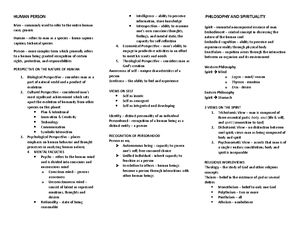Have you ever found yourself watching a group of friends interacting and wondered, “Why are they behaving that way?” Or perhaps you’ve observed a company struggling to adapt to a changing market and questioned, “What’s driving these decisions?” Understanding the complex dynamics of human behavior and social systems requires a framework, a tool to help us analyze and make sense of the world around us. Enter the functional perspective, a powerful theoretical lens that offers valuable insights into how individuals, groups, and organizations operate.

Image: www.studocu.com
The functional perspective, rooted in the principles of sociology, views social phenomena not as isolated events, but as integral parts of a larger system. It emphasizes the interconnectedness of elements within a social system and how each component contributes to the overall stability, functionality, and survival of that system. This unique approach provides a framework for analyzing the intricate web of interactions and relationships that shape our social world.
A Deeper Dive into the Functional Perspective
The foundation of the functional perspective lies in the work of Émile Durkheim, a prominent sociologist who stressed the importance of social solidarity and the need for a shared set of values and beliefs to maintain social order. Durkheim believed that social institutions like the family, education, and religion serve essential functions in society, fostering cohesion and stability.
Key figures in the development of the functional perspective include Talcott Parsons and Robert Merton. Parsons expanded on Durkheim’s ideas, proposing that social systems are characterized by four functional prerequisites: adaptation, goal attainment, integration, and latency. He argued that societies must meet these needs to ensure their survival. Merton, on the other hand, introduced the concept of “manifest” and “latent” functions, highlighting the unintended consequences of social actions.
The Functional Perspective in Action
Let’s consider a real-world scenario: a school system. From a functionalist perspective, schools serve several crucial functions:
- Education: Primarily, schools transmit knowledge and skills to future generations, preparing them for roles in society.
- Socialization: Schools play a vital role in socializing children into the norms, values, and beliefs of the larger society.
- Social Control: Schools enforce rules and regulations, promoting conformity and order within the educational system.
- Economic Function: Education is often seen as a pathway to economic success, providing individuals with the skills and knowledge necessary for the workforce.
However, the functional perspective also acknowledges the potential for dysfunction. For instance, a school system that is underfunded or overcrowded may not be able to fulfill its intended functions effectively. Students may experience inadequate learning environments, teachers may feel overwhelmed, and the overall quality of education may suffer.
Beyond the Textbook: Applying Functional Theories
The functional perspective isn’t just a theoretical framework; it’s a tool for understanding and navigating real-world complexities. Here are some practical applications:
- Organizational Analysis: Managers can utilize the functional perspective to analyze the various departments within their organization, assessing their contributions to the overall goals and identifying potential areas for improvement.
- Policy Evaluation: Policymakers can employ this perspective to evaluate the intended and unintended consequences of proposed policies, ensuring that they contribute to the overall well-being of the community.
- Conflict Resolution: Understanding the underlying functions of social systems can be crucial for resolving conflicts, as it helps identify the needs and interests of different parties involved.

Image: www.studocu.com
Expert Insights and Actionable Tips
From experts like Anthony Giddens, who highlighted the role of power in social systems, to contemporary scholars who are exploring the functional perspective in the context of globalization and technological change, the theory is constantly evolving. However, some key insights remain relevant:
- Systems Thinking: Recognize that social phenomena are interconnected, and changes in one part of the system can have ripple effects throughout.
- Critical Assessment: Don’t take social systems for granted. Question the intended and unintended consequences of social actions and consider how power dynamics might influence outcomes.
- Promoting Function: Be proactive in contributing to the positive functioning of the social systems you are part of, whether it’s your community, your workplace, or your family.
Functional Perspective Example
Conclusion
The functional perspective, even with its limitations, provides a valuable framework for understanding the diverse and complex dynamics of social life. By viewing social systems as interrelated components that work together to achieve certain functions, we gain a deeper appreciation for the underlying forces that shape our world. Whether you’re studying sociology, trying to make sense of current events, or simply seeking a deeper understanding of human behavior, the functional perspective offers a powerful lens for navigating the complexities of our interconnected world. Embrace the challenge of critical thinking, engage in constructive dialogue, and strive to promote functional social systems that benefit all.



/GettyImages-173599369-58ad68f83df78c345b829dfc.jpg?w=740&resize=740,414&ssl=1)


